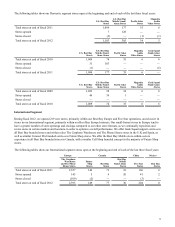Best Buy 2012 Annual Report Download - page 18
Download and view the complete annual report
Please find page 18 of the 2012 Best Buy annual report below. You can navigate through the pages in the report by either clicking on the pages listed below, or by using the keyword search tool below to find specific information within the annual report.18
process, shortening the time between the filing of a petition and an election being held. Additional changes are anticipated in
2012. As of March 3, 2012, none of our U.S. operations had employees represented by labor unions or working under collective
bargaining agreements. Changes in labor-related statutes or regulations could increase the percentage of elections won by
unions, and employers of newly unionized employees would have a duty to bargain in good faith over matters such as wages,
benefits and labor scheduling, which could increase our costs of doing business and materially adversely affect our results of
operations.
Additional legislation or rulemaking relating to environmental matters, including but not limited to, energy emissions,
could have a material adverse impact on our business.
Environmental legislation or rulemaking efforts could impose unexpected costs or impact us more directly than other
companies due to our operations as a global consumer electronics retailer with over 4,000 stores and 91 distribution centers
worldwide.
Specifically, environmental legislation or international agreements affecting energy, carbon emissions, water or product
materials are continually being explored by governing bodies. Increasing energy and fuel costs, supply chain disruptions and
other potential risks to our business, as well as any significant rulemaking or passage of any such legislation, could materially
increase the cost to transport our goods and materially adversely affect our results of operations.
Regulatory developments in the U.S. could impact the promotional financing offers available to our credit card
customers and have a material adverse impact on our revenue and profitability.
We offer promotional financing in the U.S. through credit cards issued by third party banks that manage and directly extend
credit to our customers. The cardholders can receive low- or no-interest promotional financing on qualifying purchases.
Promotional financing credit card sales accounted for 20%, 18% and 17% of our Domestic segment's revenue in fiscal 2012,
2011 and 2010, respectively.
If future legislative or regulatory restrictions or prohibitions arise that significantly alter the operational, economic or
contractual aspects of these programs and we or the issuing banks are unable to adjust in a timely manner, our revenue and
profitability may be materially adversely affected.
Changes to our credit card agreements could adversely impact our ability to facilitate the provision of consumer credit
to our customers and could materially adversely impact our results of operations.
We have agreements with third party banks for the issuance of promotional financing and customer loyalty credit cards. Under
the agreements, the banks manage and directly extend credit to our customers. The banks are the sole owner of the accounts
receivable generated under the credit card programs and absorb losses associated with non-payment by the cardholders and
fraudulent usage of the accounts. We earn revenue from fees the banks pay to us based on the number of credit card accounts
activated and card usage, as well as revenue generated from various enhancement services products such as debt cancellation,
credit monitoring and identity protection services . The banks also reimburse us for certain costs associated with our credit card
programs. Financing fees are paid by us to the banks and are variable based on certain factors such as the London Interbank
Offered Rate (“LIBOR”), charge volume and/or the types of promotional financing offers.
As a result of the continuing changes in the economic and regulatory environment for banks, these institutions continue to re-
evaluate their strategies, practices and terms, including, but not limited to, the levels at which consumer credit is granted and
the strategic focus on various business segments, such as the retail partner card business. If any of our credit card programs
ended prematurely or the terms and provisions, or interpretations thereof, were substantially modified, our results of operations
and financial condition may be materially adversely impacted.
Our International activities subject us to risks associated with the legislative, judicial, accounting, regulatory, political
and economic conditions specific to the countries or regions in which we operate, which could materially adversely
affect our financial performance.
We have a presence in various foreign countries, including Bermuda, Canada, China, France, Germany, Hong Kong, India,
Ireland, Japan, Luxembourg, Mexico, the Republic of Mauritius, the Netherlands, Portugal, Spain, Sweden, Switzerland,
Taiwan, Turks and Caicos, and the U.K. During fiscal 2012, our International segment's operations generated 26% of our
revenue. Our future operating results in these countries and in other countries or regions throughout the world where we may
operate in the future could be materially adversely affected by a variety of factors, many of which are beyond our control,
including political conditions, economic conditions, legal and regulatory constraints and foreign currency regulations.
























